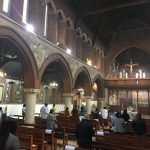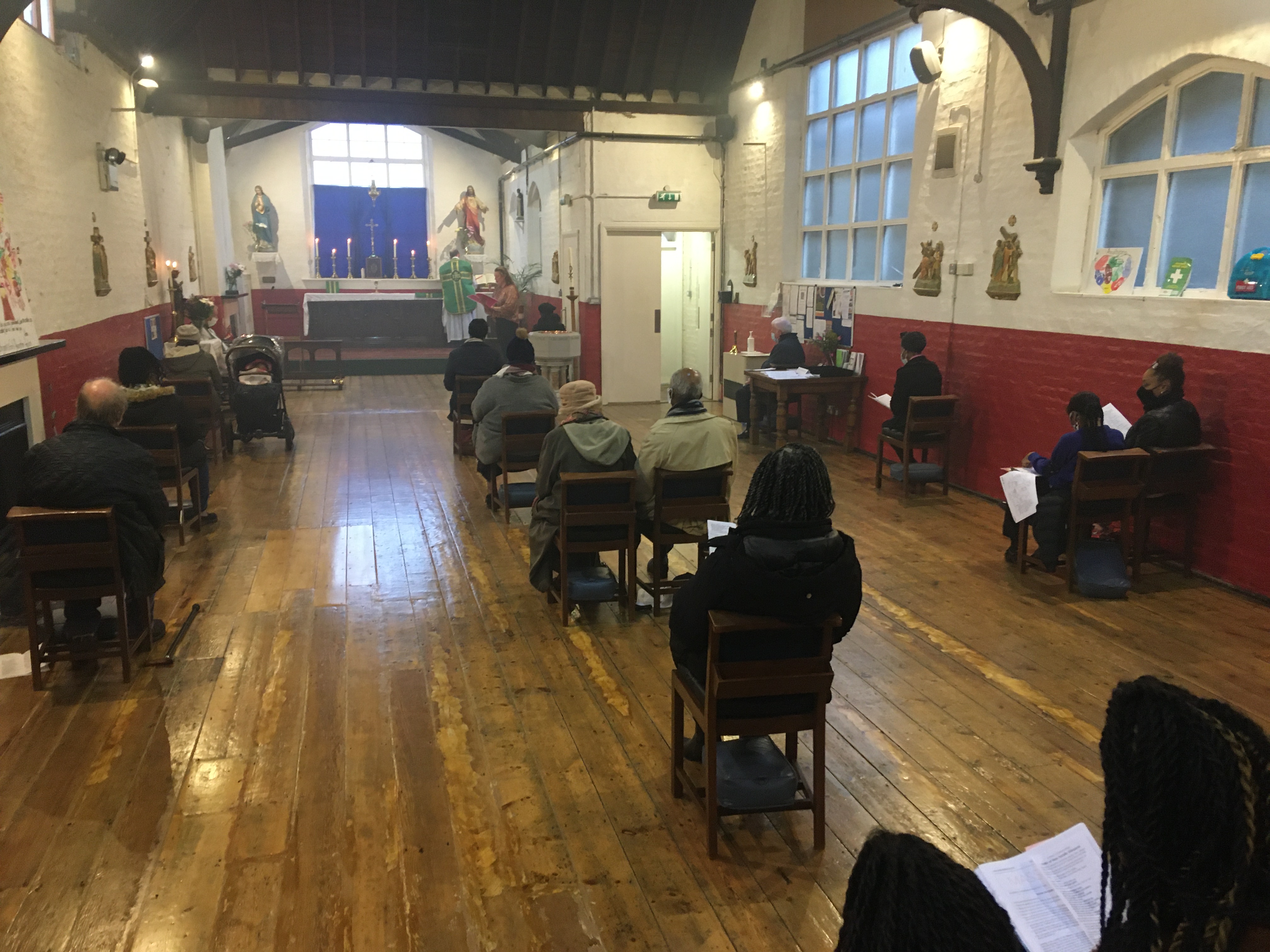SMC – 14th April 2019
Preacher: Fr Morris | Series: Lent 2019, Traditionalist Catholicism | There’s been a great revival of late in family history, people rummaging through history records of births and marriages and deaths and seeing who their relations and ancestors were. I think there’s even been television programmes around it: “Who do you think you are?” is one. The subject in our sermon series this week is worshipping with the saints, an important part of what we do as Traditionalist Catholics in the Church of England. But the saints are not former members of the church we learn about for historical interest, they’re fellow members of the Church now!
I hope we can be a community where we are better at getting to know and supporting each other. The first Christians held everything together in common, we’re told in the Acts of the Apostles (2:44), and they did much more together than we do today in most instances. And one set of people we’re great at ignoring in our church family are the saints, those who have lived faithful lives on earth and who now worship God in Heaven. To ignore the saints is to give too much power to death, believing it separates us from others who worship God. But no, be glad of this fellowship with those who first witnessed the Resurrection like St Mary Magdalene and St Peter; those who were murdered by the Nazis for their faith and love, like St Theresa Benedicta and St Maximilian Kolbe; those from Africa like St Augustine of Hippo and St Charles Lwanga; those who looked after the young like St John Bosco; those who were teenagers when they died like St Agnes and St Maria Goretti. When we worship God here in Church we take part in something that they are also doing at the same time in Heaven.
We believe in the communion of saints, we declare in the Creed. But in a world where we don’t know the names of our neighbours living above and below us it can seem increasingly difficult to preach that Christians ought to know who the saints are. And yet the Church is built on them, as St Paul, extols gladly: “You are no longer strangers and foreigners, but fellow citizens of the saints and members of God’s household, built on the foundation of the apostles and prophets” (Ephesians 2:19). They are like the tree that Zachaeus needed so as to see the Lord: they have walked the path before and through seeing their triumphs and their successes, we can know where we will find it difficult and what might help us. When all else fails we know too that we will still have them interceding for us when we ask for their support. Yes, the communion of saints remind us we do this thing of being a Christian with others, never alone, never in our own strength, and never simply with an earth-oriented view.
In our Gospel today we saw Jesus witnessing to the truth of God Incarnate. In Isaiah 50, we were shown the higher way we are to follow in patient obedience and submission to the sufferings that God will help us through. In Philippians 2 the need for service and humility was compellingly given to us as Paul reflected on these qualities in our Saviour. We see these lived out concretely in those whose lives have allowed God’s grace to be sovereign in them. They sinned and so give us the hope that despite our sin we too can share in Christ’s victory! Here are some examples:
St Bernadette of Lourdes was a fourteen year old girl when she received the vision of Our Lady in Lourdes. Now six million people visit Lourdes every year. Six million! The temptation is to surely to think, ‘Gosh she must have had a great life after that, I wish something like that would happen in my life!’ Except Bernadette died of tuberculosis, aged 35. She had a pretty rotten life in a convent afterwards, plagued with sickness. But her faith continued to find expression and she continued to love the Lord more and more. The saints are reminders that fidelity to the Cross of Jesus will not mean celebrity or worldly money or an easy life. It will be hard for us to park here to get to Mass when the Spurs are playing, but the life of ease is not what this Holy Week shows us is to be the lot of those united to Christ. St Bernadette, pray for us!
The saints also reveal the blessings of poverty, of not having very much, of not wanting very much. St Francis lived in Assisi in the thirteenth century and could have been the richest man in his town because of his father’s wealth from the thriving cloth trade. He lived accordingly, partying and enjoying himself. He had a military career, a perfectly respectable one too. But one day he heard the voice of our Lord. God asked him whether he should follow the servant or the Master. Francis responded that he should follow the Master, of course, and this encounter led Francis to reject his career. In Rome, aged twenty five, he exchanged his fine clothes for those of a beggar and heard his great calling to support the Church, which was falling down: “Francis,” the voice of God came, “go and repair my house.” St Francis of Assisi, pray for us!
It may be that you have great skills in administration or getting things done, that you work in an organisation that has particular resources. In which case, ask St Ambrose to pray for you. Before he was a bishop, he worked skilfully and peaceably as a lawyer and in the administration of the town of Milan and this won for him such renown that people longed for him to bring his virtues to the Church and be ordained the bishop. So too, our godly living is to be manifest when we do those things we have to do on a day-to-day basis. St Ambrose, pray for us!
St Boniface, an English man who went to Germany to help spread the Gospel in the eighth century, when he arrived was confronted with lots of superstition and paganism. People had associated particular trees with magical powers. What did he do with one he found? He chopped it down. There will be paths we need to clear in our lives and in the lives of our families and work places and communities to do with superstitions and pagan practices and we need to chop them down. St Boniface, pray for us!
If you’re a teenager rebelling, know that one of the greatest thinkers of the Christian faith, St Augustine, did exactly that and wrote about it in his book, Confessions, readily available. If you’re a parent witnessing your child going through that trial, ask for St Monica’s prayers. She wept when she saw what her darling little boy Augustine was up to and prayed for him and kept inviting him back to Mass and kept on loving him and eventually God called him home. St Augustine, pray for us! St Monica, pray for us!
So, how do we live out this awareness of our communion with the saints? Well, a church that values the saints will celebrate their feast days. Look at the calendar on the Mass sheet for this week and you will see no saints’ days mentioned because we focus on the events that won for us our salvation; but on most weeks of the year you will. Maybe on that day even if you can’t get to Mass, try and find out something about that saint. Also, at Mass it’s good for us to pray the Hail Mary, asking for the prayers of Mary the Mother of God. Come along on Tuesdays at 7pm and we ask at length for those prayers as we say the Rosary and rejoice at our identity which shows forth the power of Mary’s prayers for us.
In this Holy Week as we give up more of our time than normal to walk with Jesus in worship and prayer, let us know that a whole heavenly host, a great cloud of witnesses walk with us, who have made this journey their own throughout the centuries. Amen.

